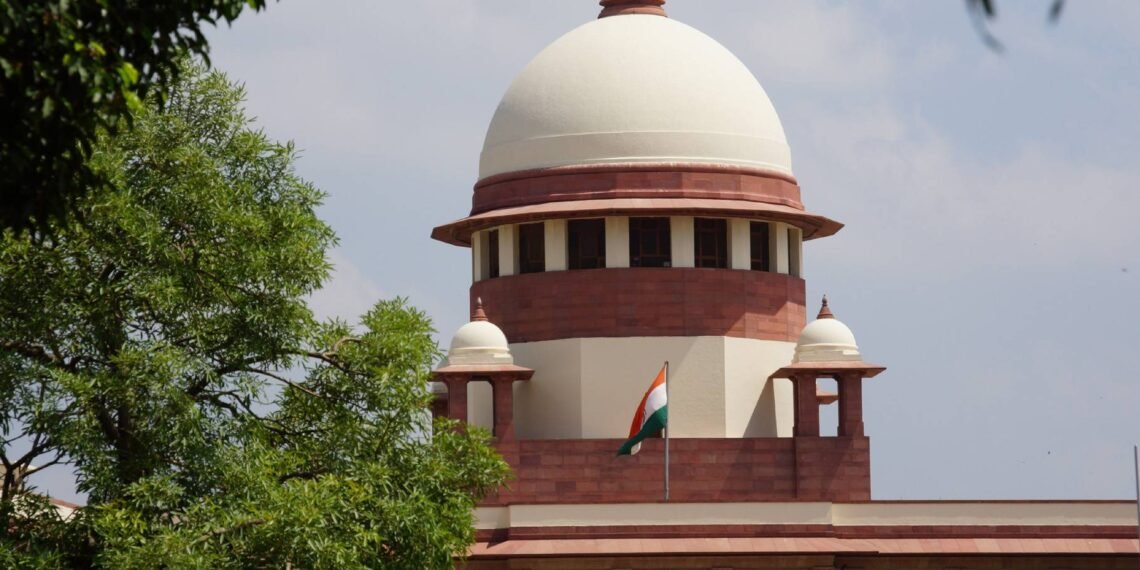In a landmark order, the Supreme Court directed trial courts across the country to refrain from passing any effective orders or conducting surveys against existing religious structures in suits disputing the religious character of such place. The intervention sent a powerful message to uphold religious harmony and prevent the misuse of historical grievances for divisive purposes.
By Navin Upadhyay
The Supreme Court’s landmark intervention to address the mandir-masjid disputes in India underscores the spirit of secularism enshrined in the Constitution by reaffirming the validity of the Places of Worship (Special Provisions) Act, 1991.
A Bench comprising Chief Justice of India (CJI) Sanjiv Khanna and Justices PV Sanjay Kumar and KV Viswanathan delivered a decisive injunction that not only reinforces the principle of non-retrogression in matters of religious harmony but also sends a powerful message about the sanctity of historical reconciliation in a diverse democracy like India.
The SC directed trial courts across the country to refrain from passing any effective orders or conducting surveys against existing religious structures in suits disputing the religious character of such places. This directive highlights the judiciary’s commitment to ensuring the Act’s provisions remain intact and unchallenged in local court proceedings.
The Places of Worship Act, enacted in 1991, mandates that the religious character of any place of worship, as it existed on August 15, 1947, shall remain unchanged. The law serves as a safeguard against revisiting historical grievances that could disrupt communal harmony. By upholding this legislation, the apex court has emphasized that India’s secular fabric cannot be torn apart by divisive forces seeking to exploit historical wounds for political or ideological gains.
Delivering the judgment, the Bench observed, “As the matter is sub-judice before this court, we deem it fit to direct that no fresh suits shall be registered or proceedings be ordered. In the pending suits, courts would not pass any effective or final orders. When a matter is pending before us, is it just and fair for any other court to examine it? We are addressing the vires as well as the ambit of the Act.”
This order directly impacts at least 18 ongoing suits filed concerning four key religious structures, including the Shahi Jama Masjid in Sambhal, the Gyanvapi Mosque in Varanasi, the Shahi Eidgah Masjid in Mathura, and the Ajmer Dargah in Rajasthan. These suits, initiated by various Hindu organizations and individuals, claim that the mosques were built over ancient temples. Muslim parties have opposed these suits, citing the protections granted under the Places of Worship Act.
The Court’s ruling represents a significant victory for constitutional morality and the ideals of fraternity and unity. It reiterates that the nation’s complex past cannot be weaponized to foment discord in the present. Instead, the focus must remain on building an inclusive future where people of all faiths coexist peacefully.
This decision is particularly significant in today’s polarized climate. In an era when polarization often overshadows dialogue and reconciliation, the reaffirmation of the Places of Worship Act serves as a timely reminder of the constitutional vision that binds this nation together. The ruling acts as a judicial check on attempts to rewrite history for sectarian purposes, ensuring that legal mechanisms are not misused to exacerbate societal divisions.
One of the petitioners in this case, Bharatiya Janata Party (BJP) leader Ashwini Upadhyay, argued that the Act allows the illegal acts of invaders who appropriated religious places to persist indefinitely, barring legal remedies for aggrieved Hindus, Jains, Buddhists, and Sikhs. On the other hand, in June 2022, the Jamiat Ulama-i-Hind moved the apex court seeking to intervene, arguing that Upadhyay’s petition indirectly targeted places of worship with Islamic associations.
Critics of the Act argue that it curtails the right to seek redressal for historical wrongs. However, as the Supreme Court’s judgment underscores, the law’s intent is not to erase history but to ensure that historical grievances do not perpetuate cycles of retribution. The Act protects the delicate balance of India’s pluralistic society and upholds the constitutional guarantees of equality and religious freedom.
Furthermore, the order underscores the judiciary’s role as the guardian of constitutional values. It signals that courts must remain unwavering in their commitment to the principles of secularism and communal harmony, even when faced with challenges that threaten these ideals.
While celebrating this judicial milestone, it is also an opportune moment for introspection. True societal harmony cannot be achieved through legal frameworks alone. It requires a collective commitment to fostering mutual respect, understanding, and dialogue among communities. Political leaders, civil society, and citizens must rise above narrow identities and work together to heal the divides that still linger in various parts of the country.
The Supreme Court’s intervention on the Places of Worship Act serves as a beacon of hope in these polarized times. It underscores the enduring strength of India’s constitutional ideals and reminds all citizens of the importance of moving forward together as one nation. As a prominent legal expert aptly stated, “This judgment is a clarion call to prioritize unity and inclusivity over division and discord.”
As we embrace this verdict, let us reaffirm our collective commitment to the values of secularism, inclusivity, and fraternity that lie at the heart of our democracy.














